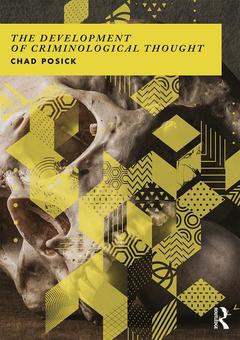The Development of Criminological Thought Context, Theory and Policy
Auteur : Posick Chad

This book focuses on the history and development of criminological thought from the pre-Enlightenment period to the present and offers a detailed and chronological overview of competing theoretical perspectives in criminology in their social and political context.
This book covers:
- A discussion of how major theorists came to espouse their ideas and how the social context of the time influenced the development criminological thought;
- An exploration of the scientific method and the way in which theories are tested;
- Details of the origins of each theory as well as their recent developments in scholarship and research;
- Comparative and international research in theory;
- The empirical support for theory and the relationship between research and policy;
- Biosocial and developmental criminology, including the biosocial underpinnings of criminal behavior and the influence of neuroscience and brain psychology;
- Theoretical applications for explaining different crime types, such as genocide, white-collar crime, and environmental crime;
- A summary of the current state of criminological knowledge and a vision for the future of criminology.
The book includes lists of further reading and chapter summaries, and is supported by timelines of key works and events. This book is essential reading for courses on criminological theory, criminal behaviour, criminal psychology and biosocial criminology.
1. Science, Theory, and Empirical Investigation, 2. Crime and Victimization, 3. Pre-Enlightenment Theories, 4. Early Biological Theories, 5. Social Disorganization Theories, 6. Anomie and Strain Theories, 7. Differential Association and Social Learning Theories, 8. Labeling and Critical Criminology, 9. Social and Self-Control Theories, 10. Deterrence and Rational Choice Theories, 11. Developmental Criminology, 12. Biosocial Criminology, 13. Criminology in International Perspective, 14. Theory and Various Crime Types, 15. The Future of Criminological Theory
Chad Posick is Assistant Professor at the Department of Criminal Justice and Criminology, Georgia Southern University, USA.
Date de parution : 05-2018
17.4x24.6 cm
Date de parution : 05-2018
17.4x24.6 cm
Thèmes de The Development of Criminological Thought :
Mots-clés :
Risk Terrain Modeling; Biosocial Criminology; Antisocial Potential; Social Disorganization; Antisocial Behavior; Labeling; Victim Offender Overlap; Anomie; Strain Theories; Institutional Anomie Theories; Self-Control Theories; Social Disorganization Theories; Developmental Criminology; Routine Activity Theories; Theoretical Criminology; Green Criminologists; Critical Criminology; Delinquent Peer Association; Social Learning Theories; DNA Methylation; Vice Versa; General Strain Theory; Self-control Theory; Anomie Theories; Delinquent Peers; Low Self-control; Georgia Southern University; Environmental Criminology; Uncertainty Avoidance; Queer Criminology; White Collar Crime; Strain Theory; Social Control Theories; Antivirus Software



